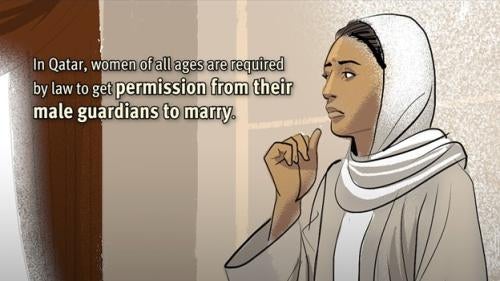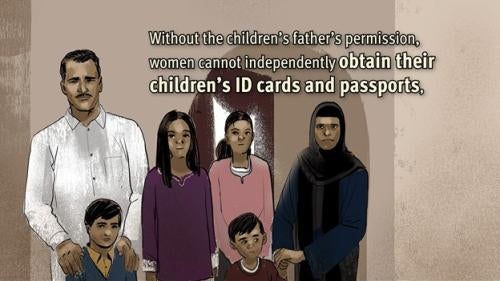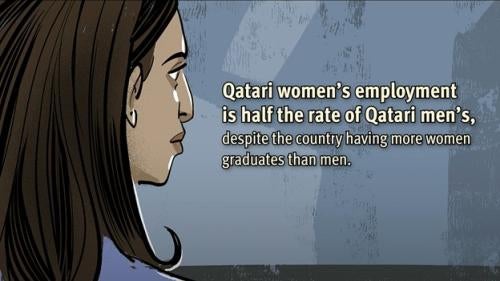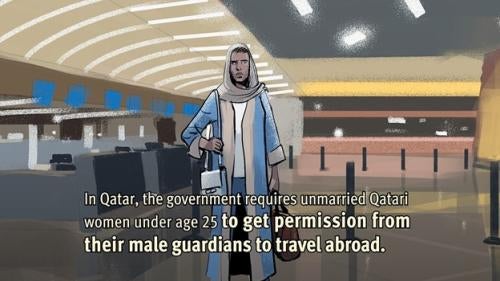Qatar’s discriminatory male guardianship system denies women the right to make many key decisions about their lives, Human Rights Watch said in a report released today.
The 94-page report, “‘Everything I Have to Do is Tied to a Man’: Women and Qatar’s Male Guardianship Rules,” analyzes official male guardianship rules and practices. Human Rights Watch found that women in Qatar must obtain permission from their male guardians to marry, study abroad on government scholarships, work in many government jobs, travel abroad until certain ages, and receive some forms of reproductive health care. The discriminatory system also denies women the authority to act as their children’s primary guardian, even when they are divorced and have legal custody. These restrictions violate Qatar’s constitution and international law.
“Women in Qatar have broken barriers and achieved significant progress in areas such as education, yet they have to still navigate state-enforced male guardianship rules that limit their ability to live full, productive, and independent lives,” said Rothna Begum, senior women’s rights researcher at Human Rights Watch. “Male guardianship reinforces the power and control that men have over women’s lives and choices and may foster or fuel violence, leaving women few viable options to escape abuse from their families and husbands.”
The Human Rights Watch findings are based on a review of 27 laws, as well as regulations, policies, forms, written communications with the government, and 73 interviews, including 50 in-depth interviews with women affected by this system. In written communications sent in February and March 2021, government representatives confirmed many of these findings and disputed others, despite Human Rights Watch evidence to the contrary.
Qatar’s laws require women to have a male guardian’s permission to marry, regardless of age or former marital status. Once married, she can be deemed “disobedient” if she does not obtain her husband’s permission before working, traveling, or if she leaves her home or refuses to have sex with him, without a “legitimate” reason. Men can marry up to four women, at a time, without needing permission from a guardian or even from their current wife or wives.

Women cannot be primary guardians of their own children at any time. They have no authority to make independent decisions relating to their children’s documents, finances, travel, and sometimes schooling and medical treatment, even if they are divorced and a court ordered that their children should live with them (“custody”), or the children’s father has died. If the child has no male relative to act as guardian, the government takes up this role.
Discrimination in laws relating to divorce and decisions concerning children has left some women trapped in abusive relationships, often waiting years to obtain a divorce. If they do leave, they may be unable to remarry for fear of losing custody of their children and remain dependent on their former husbands, who remain the children’s legal guardian.

Women interviewed said that their male guardians had prohibited them from studying abroad or attending mixed-gender universities in Qatar, limiting what they could study and their future careers. Women indirectly need male guardian permission for government scholarships to pursue higher education. Women reported facing restrictions at the state’s sex-segregated Qatar University, including needing guardian permission to enter or leave the campus in a taxi, to live in student housing, and to take field trips as part of their studies.
The government, in its written response to Human Rights Watch, said that women can act as guardians to obtain passports or ID cards for their children, that women do not need guardian permission to accept a scholarship or to work at ministries, government institutions or schools and that guardian approval is not required for educational field trips at Qatar University that are part of academic programs. However, Human Rights Watch research, including interviews and review of documents such as requests by schools and workplaces for guardian permission, conflicted with the government’s claims.
Qatari women told Human Rights Watch they needed male guardian permission to work in many government jobs, including ministries and government schools. While no law requires women to have guardian permission to work, no laws prohibit discrimination against women in the recruitment process.

Human Rights Watch found that unmarried Qatari women under 25 must obtain guardian permission to travel abroad, and that women can also be subject to travel bans at any age by their husbands or fathers. On travel and other issues, a lack of transparency over the rules and when they change makes it difficult for women to challenge them. In 2020, airport officials stopped some women traveling without a male relative and insisted on calling their male guardian to prove that they were not “escaping.” The authorities stopped both unmarried Qatari women under 25 with valid exit permits and women over 25, who should not require such permission.

Women also said they had to show proof of marriage to access some sexual and reproductive health care, for example, prenatal care, transvaginal ultrasounds, pap smears, and sexual health checks. They also needed their husband’s consent for some forms of reproductive health care relating to childbearing, such as sterilization and abortion.
Some hotels prohibit unmarried Qatari women under age 30 from renting a hotel room unaccompanied by a male relative, and Qatari women are prohibited from attending some events and entering places that serve alcohol.
Foreign national women in Qatar, who are dependent on their husbands or fathers as their visa sponsors, are also under controls comparable to male guardianship. Women need their visa sponsor’s permission to get a driver’s license, work, or obtain a government scholarship to study in Qatar.
Most of the women interviewed said that the rules have taken a heavy toll on their ability to lead independent lives. Some said it has affected their mental health, contributing to self-harm, depression, stress, and suicidal thoughts.
Women in Qatar are becoming more vocal about their rights, especially online. But laws limiting freedom of expression and association, government intimidation, and online harassment remain serious obstacles, Human Rights Watch found. There are no independent women’s rights organizations.
Male guardianship rules contradict some of Qatar’s own laws that set the end of guardianship at age 18 and violate its constitution and the country’s obligations under international human rights law. It also makes it difficult for Qatar to realize its National Vision 2030, which sets out the country’s long-term goals, including on a diversified workforce with opportunities for Qatari women.
“By enforcing male guardianship rules, Qatar is failing women and now falling behind neighboring countries when they were once in some instances leading the way,” Begum said. “Qatar should remove all discriminatory rules against women, publicize these changes, pass anti-discrimination legislation, and ensure that women have the civic space to demand their rights.”
Individual Accounts from the Report
“Nawal,” a 32-year-old Qatari woman, said when she applied to the state marriage committee to allow her, a Qatari national, to officially marry a foreign national according to Qatari law, her brother refused to give his permission as her guardian. “I needed his signature and letter and he kind of felt powerful and showed resistance,” she said. “We had a personal issue, and he was like, ‘I’m not going to help you.'”
Um Qahtan, a 44-year-old Qatari woman, said that her husband had threatened her that if she left him, he would prevent their four children from traveling with her, and transfer the children from international schools to government schools. She said after she left him, “he has done both things.”
In a February 2021 hearing, she said a judge rejected her petition to transfer her son to a different school on the basis that he could not interfere with the father’s “God-given right to decide where his child goes to school.”
“Sanaa,” a 31-year-old Qatari woman, said: “To get a scholarship to study abroad you need guardian permission … Even at Qatar University, as a TA [teaching assistant], you need your legal guardian’s permission stating that they don’t mind you going and continuing your studies abroad.”
“Nayla,” a 24-year-old Qatari teacher, described how in 2019 to work as a teacher: “I had to get my father’s ID and letter of consent that he doesn’t mind me taking this job and working with this place…. It’s for the Ministry of Education.”
“Muna,” a 32-year-old Qatari woman, said authorities stopped her at the airport in 2020 and said, “there are new internal state regulations.” She said she refused to give her father’s number initially and argued: “what you are doing is illegal, the law says I can travel above 25.” But, she said, “They said it’s in the best interest of the internal state security of Qatar and best interests of families of Qatar … Then I gave him the number and I hoped my dad is awake, it was midnight, and he is 67…. We are citizens and have the right to know what law we are being stopped for.”
“Dana,” a 20-year-old Qatari woman, said, when she was 18, she had to lie that she was married by giving her friend’s name and number as her husband to obtain urgent health care even though it did not relate to sexual activity. “One time, an ER doctor referred me to the women’s hospital for an ultrasound,” she said. “I was in so much pain he thought my ovary had burst. But they wouldn’t give me a vaginal ultrasound without a marriage license. They refused to actually do a physical on me because I wasn’t married.”
“Nadine,” a 33-year-old British resident in Qatar, said she had suffered from endometriosis since the age of 13 but could not get it diagnosed in Qatar until a few years after getting married. She said that healthcare workers would not allow her to undergo certain examinations including a transvaginal ultrasound, a pap smear test, or a womb biopsy without a marriage certificate. She said: “You suffer in silence. I had horrible pain.”
